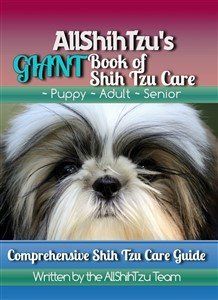When a Shih Tzu is Always Hungry
Overview
Polyphagia, or increased food consumption, is a condition that can affect both puppies and adult dogs, including the Shih Tzu. This involves a dog exhibiting a seemingly insatiable appetite, with or without weight gain.
This article explores the various reasons behind a Shih Tzu's excessive hunger, covering how age impacts appetite, the top six reasons for constant hunger, and health conditions that may lead to an unending appetite, including warning signs.
Please note: AllShihTzu is reader-supported, and some of the product suggestions on this page are affiliate links. As an Amazon Associate we earn from qualifying purchases. This is at no extra cost to you and helps keep this site running.
Puppy vs Adult vs Senior - How Age Relates to Appetite
The first year of a Shih Tzu's life is marked by rapid growth, with intermittent gains and some stalls, but follows an upward trajectory. Growth typically slows around 10 months and often ceases by the 1-year mark, although minor changes can occur up to 14-16 months as they may gain a little more in height and lean out in build.
Puppies eat not just to maintain their weight but to grow and fill out, which is why they require more calories per pound than adult dogs — around 55 calories per pound for puppies compared to about 40 for adults. This higher calorie need, combined with a Shih Tzu puppy's high metabolism and active nature, often results in a seemingly insatiable appetite as they burn through food quickly and need to refuel often.
Adults that have reached their final size are in their prime. Gone is the hyper puppy stage yet healthy adults are plenty active. A Shih Tzu adult's appetite should be strong. It's always a good thing when a dog is receptive to snacks and looks forward to their meals. This said, if a Shih Tzu is given 3 meals a day and several snacks but never seems to be satisfied, this is something that should be addressed. Details ahead.
Top 6 Reasons a Shih Tzu May Always Act Hungry
What happens: If a Shih Tzu is underfed, they'll constantly feel hungry, and if overfed, they may overeat just because food is available, as many dogs eat what they're given regardless of need.
What to do: Check if the amount you're feeding your Shih Tzu aligns with the recommended serving sizes on the dog food label, typically found under 'Feeding Guidelines'. These guidelines, based on age and weight, provide a fairly accurate estimate within a 10% range.
To ensure proper feeding, know your dog's weight (your vet can help with this, often at no charge) and refer to these feeding instructions. Remember, the listed serving size is usually for the entire day, not per meal, so divide it by the number of meals you provide (usually three for most Shih Tzu dogs).
What Fillers Are: Fillers in dog food are low-cost ingredients used to add bulk to kibble without providing significant nutritional value. These ingredients, typically devoid of essential nutrients like proteins and vitamins, offer only temporary satiety, as they pass through a dog's system without being properly digested.
Examples: Common fillers include corn and its derivatives (such as corn meal and corn gluten meal), various types of flour (including wheat and rice flour), and soy products. Even in popular brands like Purina One Natural and Royal Canin Health Nutrition, these fillers often appear among the top ingredients. For instance, Purina One Natural lists rice flour and corn gluten meal high on its ingredient list.
Consequences: A diet high in fillers can lead to a cycle of constant hunger and potential malnutrition in dogs. Symptoms include coat issues (such as hair loss), digestive problems (like flatulence and irregular stools), vomiting bile, lethargy, depressive behavior, poor skin health (like overly dry skin), and in severe cases, tooth loss, weakened bones, vision problems, and coprophagia (eating feces).
What to Do: If you find that fillers are among the top five ingredients in your dog's food, it's advisable to switch to a better-quality diet. Look for quality foods for Shih Tzu dogs that prioritize real meats, vegetables, and fruits as their main ingredients, and avoid those containing wheat, corn, or soy as key components. This shift can significantly improve your little guy or gal's overall health and well-being.
What happens: Dogs, like humans, need more food when their activity levels increase. This is often the case with Shih Tzus, particularly during seasons like spring and summer when they're likely to enjoy more walks, park visits, and activities, leading to a higher appetite.
What to do: While general guidelines on how many calories a Shih Tzu needs are helpful, they're just estimates. Your dog's requirements can vary by up to 20%, influenced by factors such as their activity level. To manage this fluctuating appetite and prevent unwanted weight gain, consider adding an extra snack per day when you notice increased hunger, or slightly increase meal portions. This approach helps meet their energy needs without overfeeding.
What happens: Chewing urges, rather than an actual increase in appetite, can lead some Shih Tzus, particularly teething puppies (usually from 4 to 9 months old), to eat more, especially hard kibble. Adults may also chew excessively due to stress or separation anxiety.
What to do: For teething puppies, maintain a regular feeding schedule and provide quality teething toys to soothe itchy gums and the urge to chew. This phase typically lasts 4 to 5 months. For adults, addressing chewing issues depends on the cause, with solutions ranging from calming methods to refocusing techniques.
See also: Chewing Issues.
- Eating very quickly can give the impression that a dog is starving.
- If a dog gulps down their food in the blink of an eye, they may be begging for more before they even realize that they're full and satisfied.
Health Conditions that can Cause a Shih Tzu to be Overly Hungry
Red Flags
- Sudden and rapid weight gain
- Increased thirst
- Diarrhea
- Vomiting
- Discomfort or pain (a dog may whine, have intolerance to be touched, held, or picked up, and/or retreating)
- Bloated stomach
- Trouble breathing
- Loss of bladder or bowels
- Excessive weakness
- Dizziness (may stumble into walls, etc.)
- Sudden aggressiveness
You May Also Like:
Shih Tzu Supplies - An organized list of supplies every pet parent should have for their Shih Tzu; this list connects to more detailed articles with tips, advice and specific recommendations. See what your Shih Tzu should have for optimal health and happiness.
Shih Tzu Summer Care - When temperatures start to rise and summer's on the way, it's time to prepare your Shih Tzu. See our top tips for keeping your little guy or gal cool, comfortable and happy all summer long.
Shih Tzu Winter Care - When the daylight hours start to get short and temperatures are dropping, it's time to winterize your Shih Tzu. See our top tips for helping your little guy or gal stay warm, safe and happy all winter long.
Join Us:

